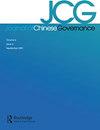The discipline of form: why the premise of institutional form does not apply to Chinese capital, technology, land and labor
IF 3.7
3区 社会学
Q1 POLITICAL SCIENCE
引用次数: 1
Abstract
Abstract China is an intellectually overwhelming paradox within development thinking. On the one hand, it is regarded as an economic powerhouse pushing forward decades of sustained growth, which even during major global crises, such as the Corona-epidemic and the 2008 Financial Crisis, bounced back with significant resilience. On the other hand, it appears burdened with all of the ‘wrong’ institutions: informal, insecure, and autocratic. This collection of papers posits that the paradox is no contradiction when understood through an alternative, theoretical lens: the function of institutions precedes form when trying to understand institutional performance. Thus, whether institutions are formal or informal, public or private, democratic or autocratic, is of secondary importance to the manner in which they function over time and space. To examine this hypothesis, known as the ‘credibility thesis’, the collection examines China’s institutions that govern: 1) capital; 2) technology; 3) land, and; 4) labor; in effect, state-owned banks, collective firms, corporate law and securities, patents and intellectual property rights, environmental bans, and the civil registration or hukou system. In so doing, it not only falsifies the widely prevalent assumption that institutional form determines performance, but concurrently, validates the applicability of the credibility thesis over widely varying sectors and assets.形式的纪律:为什么制度形式的前提不适用于中国的资本、技术、土地和劳动力
摘要中国是发展思维中一个智力上压倒一切的悖论。一方面,它被视为推动数十年持续增长的经济强国,即使在科罗纳疫情和2008年金融危机等重大全球危机期间,这种增长也以显著的韧性反弹。另一方面,它似乎背负着所有“错误”的制度:非正式、不安全和专制。这组论文认为,当通过另一种理论视角来理解时,悖论并不矛盾:当试图理解制度绩效时,制度的功能先于形式。因此,无论机构是正式的还是非正式的,公共的还是私人的,民主的还是专制的,都比它们在时间和空间上的运作方式次要。为了检验这一被称为“可信度理论”的假设,该集考察了中国的治理机构:1)资本;2) 技术;3) 土地,以及;4) 劳动;实际上,国有银行、集体企业、公司法和证券、专利和知识产权、环境禁令以及民事登记或户口制度。在这样做的过程中,它不仅证伪了普遍存在的制度形式决定绩效的假设,而且验证了可信度理论在广泛不同的部门和资产中的适用性。
本文章由计算机程序翻译,如有差异,请以英文原文为准。
求助全文
约1分钟内获得全文
求助全文

 求助内容:
求助内容: 应助结果提醒方式:
应助结果提醒方式:


